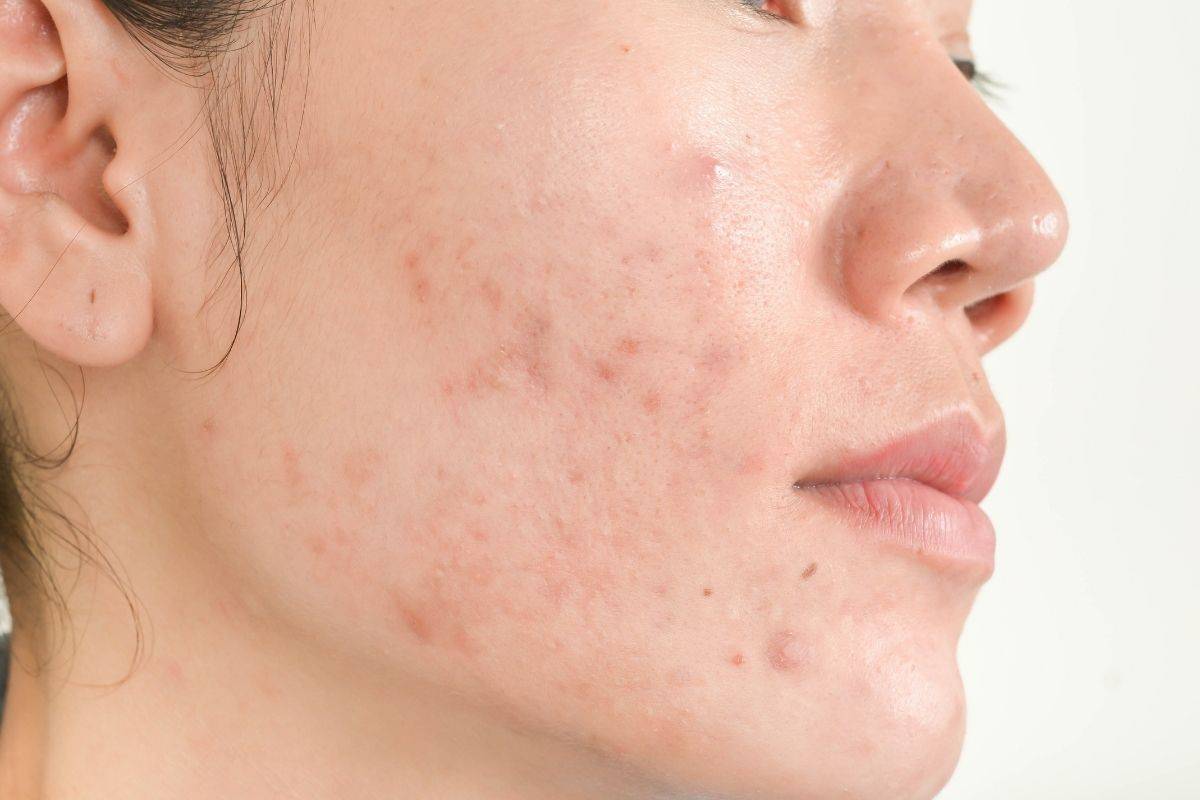Acne is most often linked with changes in hormone levels during puberty, when androgens cause grease-producing glands next to hair follicles to become larger. Certain medications – such as steroids and oral contraceptives – may exacerbate acne symptoms further.
Many skin care and cosmetic products, even those designated “oil-free” or “noncomedogenic,” can clog pores. Gritty or coarse cleansers may irritate skin further and lead to additional acne breakouts.
Causes
Sebum produced by sebaceous glands can clog pores with dead skin cells and hair, leading to whiteheads and blackheads. Sometimes a pore’s wall becomes inflamed, producing red bumps called pimples; when one opens completely, bacteria enter and cause an infection that produces pus leading to painful cysts or nodules.
Acne most commonly arises on the face, neck, chest and shoulders as these areas contain the highest concentration of oil glands and hair follicles. Acne can also have serious implications on one’s self-confidence.
Some individuals develop acne because of lifestyle choices or medications they take, including using over-the-counter or prescription cleansers that are too harsh or astringent, not washing their face often enough, picking at their skin, wearing tight-fitting clothing and not picking at their acne regularly enough. Other causes for acne can be hormone changes that occur during adolescence; stress; corticosteroids or lithium medicine and certain foods, like chocolate, greasy fast food or dairy products which worsen acne for some individuals.
Symptoms
Acne is caused when sebaceous glands (oil glands) produce too much sebum. This causes pores to become clogged with sebum and dead skin cells, blocking out light. After that, bacteria that naturally live on our skin (C. acnes) begins to multiply and cause inflammation resulting in blackheads, whiteheads, pus-filled bumps (papules or pimples).
Acne is most prevalent during puberty; however, it may also appear during early adulthood or continue into middle age. Males are more prone to acne than females.
Some factors that exacerbate acne include squeezing or overwashing of the skin. Greasy hair products and face scrubbing may irritate and increase oil production. Therefore, using gentle cleansers with lukewarm water should be used when cleansing. In order to prevent future breakouts of acne it’s also recommended using products labeled noncomedogenic or nonacnegenic such as makeup, sunscreens or moisturizers that could block pores. Stress doesn’t typically cause it; but can make symptoms worse; diet is believed not contributes either!
Treatment
Acne is a skin condition most prevalent among teenaged people and often arises during these years. Both males and females can experience acne. Acne occurs when oil (sebum) becomes trapped in hair follicles near the surface of skin, stimulating bacteria that live within it to cause inflammation through blocked pores that become clogged with sebum accumulating on its surface.
Cleansing the skin properly is an integral component of acne treatment and should be done gently as excessive rubbing and scrubbing may exacerbate acne further and result in scarring. Over-the-counter and prescription meds that reduce oil production such as salicylic acid or benzoyl peroxide-containing cleansers may also help.
Diet is also essential. Consuming foods with low glycemic index values such as leafy vegetables, fruits, and whole grains may help some individuals reduce acne. While dairy products such as cheese can aggravate existing conditions further, dairy should be avoided to help alleviate symptoms. Some patients may require prescription medicines like retinoids and oral isotretinoin; these must be taken exactly as prescribed in order to avoid severe side effects including birth defects.
Prevention
Even though complete prevention of acne may not be achievable, taking measures to minimize pimples and scarring can make a difference. Use a gentle cleanser with warm water twice a day when washing your skin with warm water to avoid irritating or worsening acne; avoid harsh scrubbers which may irritate the surface layer of skin and worsen existing spots; acne is caused not by dirt on its own but by oil build-up in pores that blocks them up; picking, squeezing or rubbing at skin can also cause inflammation as well as scarring effects resulting in inflammation as well as scarring effects resulting from inflammation as well as scarring.
Acne can occur due to hormonal issues like polycystic ovary syndrome or pregnancy. Certain medications may also trigger it as side effects. Eating high glycemic foods (foods with lots of sugar and carbohydrates) and processed meats may trigger acne for some people as these foods increase blood sugar levels, prompting your body to produce more sebum – selecting foods low in both sugar and fat can help avoid or reduce acne breakouts.


